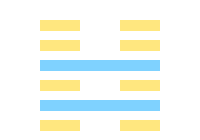28.3.5 (28 > 40)

28.3.5 (28 > 40) - THE TÂ KWO HEXAGRAM.
- 3. The third line, undivided, shows a beam that is weak. There will be evil.
- 5. The fifth line, undivided, shows a decayed willow producing flowers, or an old wife in possession of her young husband. There will be occasion neither for blame nor for praise.
28.3.5 (28 > 40) - Making a flop
One becomes the target of mockery when others learn that one has been disappointing.
Bing DeepL Google Yandex28.3.5 (28 > 40) - Making a flop
One becomes the target of mockery when others learn that one has been disappointing.
Bing DeepL Google Yandex28.3.5 (28 > 40) - Tá kvoh, le grand excès
Tá kvoh : 1. Grand excès, défaut, manquement ; 2. Traverser, dépasser.
- 3. Une poutre, un pilier trop faible (voir texte I) sont mauvais (ils ne peuvent supporter) (grand défaut).
- 5. Un vieux saule produisant une fleur, une vieille femme épousant un homme encore jeune, quoique non blâmables, ne peuvent être loués. La fleur du vieux saule ne peut durer, l’époux d’une vieille femme peut s’en dégoûter. (Faits qui passent les règles ordinaires.)
28.3.5 (28 > 40) - Faire un flop
On devient la cible de moqueries quand les autres apprennent qu'on a été décevant.
Bing DeepL Google Yandex28.3.5 (28 > 40) - Lemondás
- 3. Ápolja kapcsolatait.
- 5. Igyekszik javítani mielőtt mások észrevennék a hanyatlást.
The trigrams
The trigrams are combinations of three yin and yang lines. The three bottom lines of the hexagram form the lower trigram and represent the inner situation. The three top lines form the upper trigram and represent the outer situation.
Upper trigram: The lake The thunder


Lower trigram: The wind The water


The formation: 28
What is already there

28 - THE TÂ KWO HEXAGRAM.
Tâ Kwo suggests to us a beam that is weak. There will be advantage in moving (under its conditions) in any direction whatever ; there will be success.
Bing DeepL Google Yandex28 - Loneliness
One goes on their own if necessary. Stick to the essential.
Bing DeepL Google Yandex28 - Loneliness
One goes on their own if necessary. Stick to the essential.
Bing DeepL Google Yandex28 - Tá kvoh, le grand excès
Tá kvoh : 1. Grand excès, défaut, manquement ; 2. Traverser, dépasser.
Texte
Grandeur défectueuse. Appui faible qui, en s’affermissant en toute manière, peut devenir utile. (Un défaut peut se réparer.)
Symbolisme
Marais couvrant des arbres. Le sage, devant un pouvoir vicieux, se tient seul sans crainte et fuit le monde sans regrets.
Commentaire
Grandeur défectueuse, colonne faible dont le haut et le bas le sont aussi. La force défectueuse au milieu de gens faibles et doux peut, si elle agit en cherchant à satisfaire, s’affermir et prospérer en tout. La grandeur excessive ou défectueuse est une chose funeste.
Note. Nous avons ici une collection d’expressions proverbiales dont plusieurs se rapportent à la forme même du Koua. Celui-ci peut, en effet, à la rigueur, figurer une poutre entamée en haut et en bas, donc très défectueuse.
On voit ici une fois de plus combien ces divisions en six parties sont arbitraires. Le § 3 n’est que la répétition du texte ; les §§ 2 et 5 se confondent.

28.3 (28 > 47) - THE TÂ KWO HEXAGRAM.
The third line, undivided, shows a beam that is weak. There will be evil.
Bing DeepL Google Yandex28.3 (28 > 47) - Tá kvoh, le grand excès
Tá kvoh : 1. Grand excès, défaut, manquement ; 2. Traverser, dépasser.
Une poutre, un pilier trop faible (voir texte I) sont mauvais (ils ne peuvent supporter) (grand défaut).
Bing DeepL Google Yandex
28.5 (28 > 32) - THE TÂ KWO HEXAGRAM.
The fifth line, undivided, shows a decayed willow producing flowers, or an old wife in possession of her young husband. There will be occasion neither for blame nor for praise.
Bing DeepL Google Yandex28.5 (28 > 32) - Renovating the facade
One hurries to repair before others notice the decline.
Bing DeepL Google Yandex28.5 (28 > 32) - Renovating the facade
One hurries to repair before others notice the decline.
Bing DeepL Google Yandex28.5 (28 > 32) - Tá kvoh, le grand excès
Tá kvoh : 1. Grand excès, défaut, manquement ; 2. Traverser, dépasser.
Un vieux saule produisant une fleur, une vieille femme épousant un homme encore jeune, quoique non blâmables, ne peuvent être loués. La fleur du vieux saule ne peut durer, l’époux d’une vieille femme peut s’en dégoûter. (Faits qui passent les règles ordinaires.)
Bing DeepL Google Yandex28.5 (28 > 32) - Ravaler la façade
On se dépêche de réparer avant que les autres ne constatent le déclin.
Bing DeepL Google Yandex28.5 (28 > 32) - Lemondás
Igyekszik javítani mielőtt mások észrevennék a hanyatlást.
Bing DeepL Google YandexIn the making: 40
What is poised to happen

40 - THE KIEH HEXAGRAM.
In (the state indicated by) Kieh advantage will be found in the south-west. If no (further) operations be called for, there will be good fortune in coming back(to the old conditions). If some operations be called for, there will be good fortune in the early conducting of them.
Bing DeepL Google Yandex40 - Kieh, la libération
Kieh : 1. Délivrer, faire échapper, échapper au danger ; 2. Disperser ; 3. Ouvrir, séparer, s’ouvrir. Se dit du mouvement de la germination. 4. Résoudre une difficulté, une complication.
Texte et commentaire
Si l’on réussit à faire échapper aux dangers, on gagnera les gens à soi et l’on aura des relations heureuses ; on gardera le milieu. En tout ce que l’on fait, l’activité est chose utile et fait acquérir des mérites. Kieh est : se trouvant en danger, savoir agir et échapper. Quand le ciel et la terre ouvrent les pores (3e sens) des êtres, le tonnerre et la pluie se produisent. Alors les plantes et les arbres à fruit bourgeonnent. Bien important est le temps où tout s’ouvre.
Symbolisme
Le tonnerre et la pluie forment le Koua Kieh. Le sage est indulgent pour l’erreur et traite les coupables avec douceur.
The nuclear hexagram: 1.2.4.6 (1 > 63)
The nuclear hexagram is the association of the two inner trigrams (lines 2,3,4 and 3,4,5). It represents the root, or the origin of the situation.

1.2.4.6 (1 > 63) - THE KHIEN HEXAGRAM
- 2. In the second line, undivided, (we see its subject as) the dragon appearing in the field. It will be advantageous to meet with the great man.
- 4. In the fourth line, undivided, (we see its subject as the dragon looking) as if he were leaping up, but still in the deep. There will be no mistake.
- 6. In the sixth (or topmost) line, undivided, (we see its subject as) the dragon exceeding the proper limits. There will be occasion for repentance.
1.2.4.6 (1 > 63) - Staying away from a problem
One returns after a rupture, without replying to their close ones.
Bing DeepL Google Yandex1.2.4.6 (1 > 63) - Staying away from a problem
One returns after a rupture, without replying to their close ones.
Bing DeepL Google Yandex1.2.4.6 (1 > 63) - K’ien, la créativité
K’ien : principe actif, force vitale universelle.
-
2. Mais il apparaît, on le voit dans les champs. Les bienfaits font voir l’homme vraiment supérieur.
L’influence de la vertu se répand au loin avantageusement. -
4. Le dragon se remue (saute) dans l’abîme ; c’est bien. (Le prince sage exerce son action sur le monde.)
Il se répand au-dehors et avance. -
6. S’il devient trop fort et dominant, il y aura lieu de le regretter.
Trop de bonne fortune ne peut durer que si l’on n’est prudent et modéré en tout.
Le principe actif doit céder au principe réceptif à certains moments ou bien les êtres ne se reproduiront pas.
1.2.4.6 (1 > 63) - Rester à distance d’un problème
On revient après la rupture, sans répondre à ses proches.
Bing DeepL Google Yandex1.2.4.6 (1 > 63) - Fejlődés
- 2. Jó képességekkel rendelkezik és tanul.
- 4. Meg tudja nevezni a problémát.
- 6. Bajba jut.
Ruler
The starting situation

28.5 (28 > 32) - THE TÂ KWO HEXAGRAM.
The fifth line, undivided, shows a decayed willow producing flowers, or an old wife in possession of her young husband. There will be occasion neither for blame nor for praise.
Bing DeepL Google Yandex28.5 (28 > 32) - Renovating the facade
One hurries to repair before others notice the decline.
Bing DeepL Google Yandex28.5 (28 > 32) - Renovating the facade
One hurries to repair before others notice the decline.
Bing DeepL Google Yandex28.5 (28 > 32) - Tá kvoh, le grand excès
Tá kvoh : 1. Grand excès, défaut, manquement ; 2. Traverser, dépasser.
Un vieux saule produisant une fleur, une vieille femme épousant un homme encore jeune, quoique non blâmables, ne peuvent être loués. La fleur du vieux saule ne peut durer, l’époux d’une vieille femme peut s’en dégoûter. (Faits qui passent les règles ordinaires.)
Bing DeepL Google Yandex28.5 (28 > 32) - Ravaler la façade
On se dépêche de réparer avant que les autres ne constatent le déclin.
Bing DeepL Google Yandex28.5 (28 > 32) - Lemondás
Igyekszik javítani mielőtt mások észrevennék a hanyatlást.
Bing DeepL Google YandexCorrection
The direction where the ruler is going to bend

28.3 (28 > 47) - THE TÂ KWO HEXAGRAM.
The third line, undivided, shows a beam that is weak. There will be evil.
Bing DeepL Google Yandex28.3 (28 > 47) - Tá kvoh, le grand excès
Tá kvoh : 1. Grand excès, défaut, manquement ; 2. Traverser, dépasser.
Une poutre, un pilier trop faible (voir texte I) sont mauvais (ils ne peuvent supporter) (grand défaut).
Bing DeepL Google Yandex
